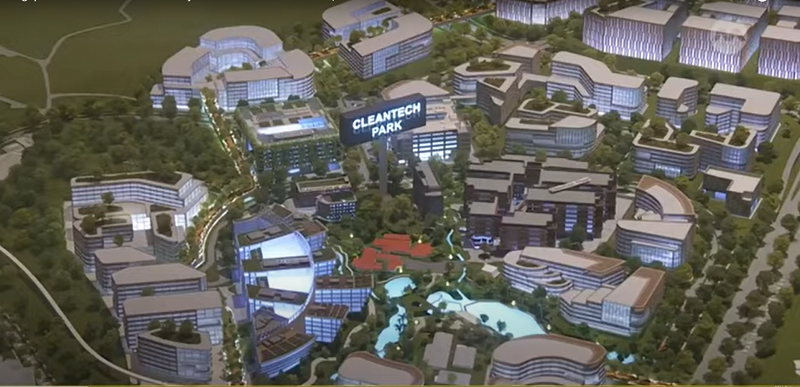
This is part of a new economic strategy to continue drawing international companies to invest here and boosting the competitiveness of key industries, amid rising cost pressures.
A model showing a part of the Jurong Innovation District. The Jurong Innovation District currently houses around 100 players across the entire advanced manufacturing value chain, including training providers, advanced manufacturers and institutes of higher learning.
SINGAPORE: Singapore is developing land space to bring small local firms closer to large multinational corporations (MNCs), with an aim to boost collaboration and innovation among them.
This is part of a new economic strategy to continue drawing global companies to invest here and boosting the competitiveness of key industries, amid rising cost pressures.
One such development under this strategy is the Jurong Innovation District (JID), a one-stop advanced manufacturing hub for Singapore.
Attracting Investments
Currently, the JID houses around 100 players across the entire advanced manufacturing value chain, including training providers, advanced manufacturers and institutes of higher learning.
The space is set to expand, with Bulim Square, one of the precincts within the district, to be completed by the second half of this year.
“With this new area, we will be able to attract even more Industry 4.0 activities and companies into JID,” said Mr Nelson Liew, group director of new estates at national industrial estate developer JTC.
“At the same time, we are also planning and implementing various infrastructure works across JID, so as to prepare the land (and) make it ready to welcome new investments in the medium and long term.”
When fully completed, the JID is expected to bring in about 95,000 new jobs in advanced manufacturing, innovation and research.
“The objective of Jurong Innovation District is for it to be a one-stop destination for technology development, where companies can come together to learn, to innovate, to test and to manufacture their products within the same estate,” said Mr Liew.
“When they are in the JID ecosystem, the companies can tap on the various sharing platforms that are available to them.”
Singapore-based battery manufacturing firm VFlowTech, for instance, relies on the nearby Nanyang Technological University (NTU) to fulfil half of its manpower needs.
“We are very close (in) proximity to NTU,” said Dr Arjun Bhattarai, the firm’s co-founder and chief technology officer.
“We have good access to professors, researchers (and) various labs, so it is much easier to just get access to them and get the support.”
Accessing talent, technology
VFlowTech is relying on this pool of university researchers for its next stage of growth.
Dr Bhattarai said with support from the ecosystem, they will be able to scale up projects, “and that could be also part of the Singapore green transition and importing the green energy from other countries”.
Being in the JID would also help the company attract more investments from abroad, “so this will definitely help us to push to go overseas”, he added.
Access to a ready pool of talent and cutting-edge technology has also given MNCs such as machine tool manufacturer Makino the confidence to venture into new markets in Singapore.
“As a newcomer in additive manufacturing (and) with NTU in close proximity, we are able to leverage on those talents to start our materials development project much earlier than what we could have done if we tried to do this internally ourselves,” said Makino Asia’s head of additive manufacturing William Goh.
“So this helped to accelerate our growth, and speed up our market entry process.”
Mr Goh said this helped to shave off at least a year of research time, and saved the firm nearly a million dollars from investing in specialised machinery.
"Many of these new equipment are extremely costly, and also take up a lot of space,” he noted.
“So being in close proximity with these partners allowed us access to all these advanced equipment.”
He added that as the JID continues to develop, there will be more engagement with different partners and sharing of ideas to “spearhead the growth of advanced manufacturing within Singapore”.
Article first published in Channel News Asia
 A Singapore Government Agency Website
A Singapore Government Agency Website



